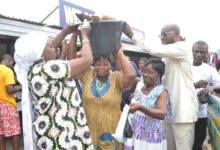
The 2020 World Menstrual Hygiene Day (MHD) was celebrated on Thursday, in Accra, with a call on institutions to collectively work to change the negative social perception on menstruation.
The event that was marked under the theme: “It is time for Action”, aimed at creating awareness about challenges adolescent girls face during menstruation, especially in the era of novel Coronavirus (COVID-19).
Speaking at the MHD Virtual Seminar, the Minister of Education, Dr Mathew Opoku Prempeh, stated that even though the world had been hit by COVID-19, “there is the need for girls to be cautious about their menstrual health.”
He observed that COVID-19 indirectly affected Menstrual Hygiene Management (MHM) and mentioned mobility restrictions, challenges in obtaining essential items, interaction reduction with social support networks and privacy of household members.
Dr Prempeh noted globally more than 800 million women and girls menstruate every day, yet they faced barriers to properly manage their menstrual periods.
He noted that the social stigma and taboos that surrounded menstruation, prevented women and girls from attending work and school.
“Even when they do attend while menstruating, the lack of access to menstrual hygiene products, lack of sanitation infrastructure such as separate toilets with changing rooms and hand washing facilities and inadequate menstrual hygiene education can prevent women and girls from reaching their full potential in the classroom, in the workplace and at home,” Dr Prempeh said.
Touching on the theme, he underscored an urgent need for individuals and institutions to empower women and girls to unlock their educational and economic opportunities.
Anne-Claire Dufay, Country Representative of United Nations International Children’s Emergency Fund (UNICEF), said that there was the need for quality data to support education on menstruation hygiene.
She said few studies had plausibly identified the role of menstrual hygiene interventions in reducing school absenteeism.
Ms Dufay said that where absenteeism was inevitable, as is the case with the current COVID-19 pandemic, interventions for increased MHM awareness that interfaced poverty, gender and education needed to move beyond individual social variables.
Director for the School Health Education Programme (SHEP) Unit of Ghana Education Service (GES), Nana Esi Inkoom, promised her outfit would collaborate with non-governmental organisations to equip schools with non-sanitary facilities to help females maintain good menstrual hygiene.
BY JOYCELINE NATALLY CUDJOE







